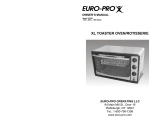Page is loading ...

Built-in Ovens Model: POD301, POD302, & PODC302
Using Convection Cooking Tips:
True Convection
Reduce recipe temperature by 25 ºF.
Place food in low-sided, uncovered pans such as cookie
sheets without sides.
Convection Roast
Do not cover meat or use cooking bags.
Use the same temperature as indicated in the recipe.
Check doneness early since roasting time may decrease.
Convection Broil/Max Convection Broil
Preheat oven 3-4 minutes. Do not preheat for more than 5
minutes.
Use broil pan and grid included with your oven.
Speed Convection
Begin cooking all frozen convenience products in a cold,
non-preheated oven. The food will still be done in package
time.
This mode is well suited for frozen convenience foods such
as sh sticks and chicken nuggets.
•
•
•
•
•
•
•
•
•
Quick Reference Guide
Self-Clean:
During Self-Clean, the oven is heated to a very high
temperature. Soil is burned off at this temperature.
ATTENTION: Wipe out excessive spillage before
self-cleaning the oven.
ATTENTION: Do not clean parts or accessories in the
Self-Clean oven.
To Set the Self-Clean Mode:
Turn the heating mode dial to “CLEAN.”
Turn the temperature dial to “CLEAN.”
Set the cleaning time (1:30 to 2:30 hours) using “+” and “-.”
Self-Clean starts after a few seconds and the oven is locked.
The oven can be opened again only after the oven has
cooled.
To cancel Self-Clean, turn the heating mode dial to “OFF”
position.
A moist cloth is the best way to wipe remaining ash from the
oven.
Note:
For double oven models—while Self-Clean is in progress in
one oven, the other oven must be off.
The oven light cannot be turned on during self-cleaning.
The special heat-resistant enamel and the polished
components in the oven can become discolored over time.
This is normal and does not affect operation. Under no
circumstances should scouring pads or abrasive cleaners be
used to treat discolorations.
•
•
•
•
•
•
•
•
•
Setting the Cooking Mode and Temperature:
Turn the heating mode dial to the preferred cooking mode.
Turn the temperature dial to the desired temperature.
The light next to “OVEN ON” (“UPPER ON”/”LOWER ON” for double
ovens) illuminates as soon as a valid cooking mode temperature has
been selected.
Preheat monitor:
The preheat monitor lls with bars while the oven heats up. All of the four
bars are visible and a beep sounds when the programmed temperature is
reached.
Note:
The cooking mode temperature ranges are limited. The oven will not
start if an invalid temperature is set. A beep sounds and “Err” appears in
the display.
For double oven models—if Speed Convection is set for one oven, the
other oven cannot run at the same time.
•
•
•
•
•
Setting the Clock:
To set the clock, no Stop Time can be active.
To Set the Analog Clock:
Press SELECT repeatedly until “CLOCK”
appears in the display.
Press and hold “+” until the desired time is
reached.
The time is accepted after a few seconds and the
clock starts running. “CLOCK” disappears from
the display.
•
•
•
Caution:
To avoid burns, place oven racks in desired positions
before turning oven on. Always use oven mitts when
the oven is warm. If a rack must be moved while the
oven is hot, do not let oven mitts contact hot heating
elements.
Oven Rack Positions:
0
6
5
4
3
2
1
Oven Bottom

Insert rotisserie rack half
way into the oven on rack
position 4.
Slide the left fork onto the
skewer and tighten the
screw.
Slide meat or poultry for
roasting onto the skewer.
Slide the right fork onto
the skewer and tighten
the screw.
Check the balance of
the food on the skewer
by rolling the skewer in
the palms of your hands.
Food not evenly balanced
will not cook evenly.
Place the rotisserie
skewer onto the rack.
Place the skewer rack
into the oven and insert
the drive shaft into the
opening on the back oven
wall.
If necessary, turn the
rotisserie skewer slightly
so that the drive shaft ts
properly into the opening.
Insert a at rack on
position 0 and insert broil
pan to catch drippings.
1.
2.
3.
4.
5.
6.
7.
8.
9.
Slip one of the forks on
the skewer with the tines
pointing to the tip of the
skewer. Loosely tighten
the screw to keep it from
slipping.
Insert the skewer through
the bird securing with the
fork.
Cut 24” of kitchen string
and lay it under the bird,
breast side up, with equal
lengths of string on each
side.
Wrap each end of the
string around each of the
wings; catch each wing
tip as the string is brought
tightly together at the top
and knotted. Do not cut off
the extra string.
Cut another 20” of string
and lay it under the back.
Wrap it around the tail
then around the skewer.
Cinch tightly.
Pull legs forward; cross
them on top of the skewer;
bring string around and tie
a tight knot.
Connect the string holding
the legs to the string
holding the wings; then
knot. Add the other fork
and push tines into the
drumsticks to secure.
Check the balance by
rolling the skewer in your
palms. The bird should
not rotate or be loose in
any way. If so, redo the
trussing. The bird will not
cook evenly if it moves on
the skewer.
1.
2.
3.
4.
5.
6.
7.
8.
Assembling the Rotisserie: Trussing Poultry for the Rotisserie:
5551 McFadden Avenue, Huntington Beach, CA 92649 • 800-735-4328 • www.thermador.com
9000202740 • 5V09RX • Rev A • 12/06 © BSH Home Appliances Corporation, 2006 • All rights reserved • Litho U.S.A.
/



